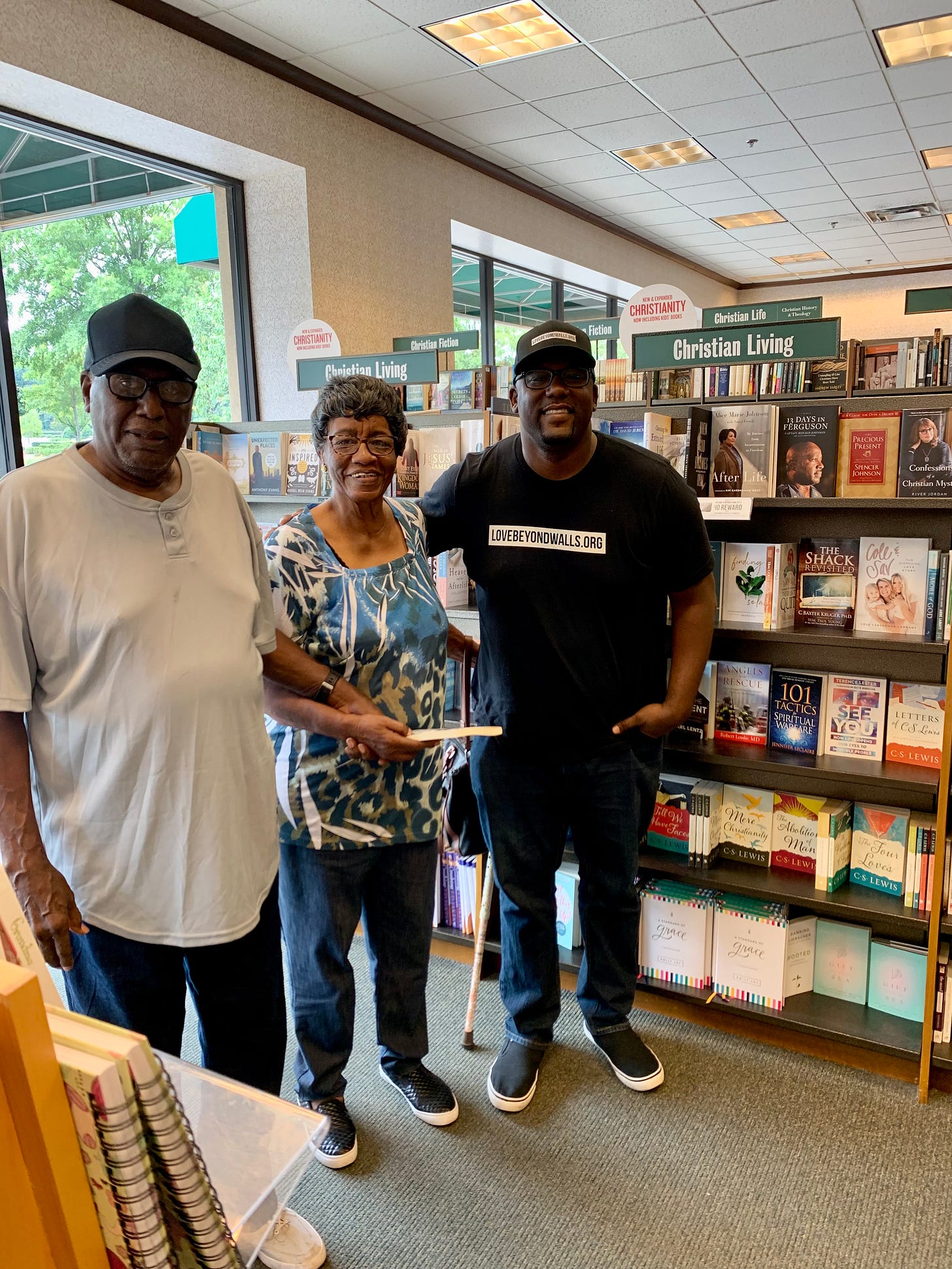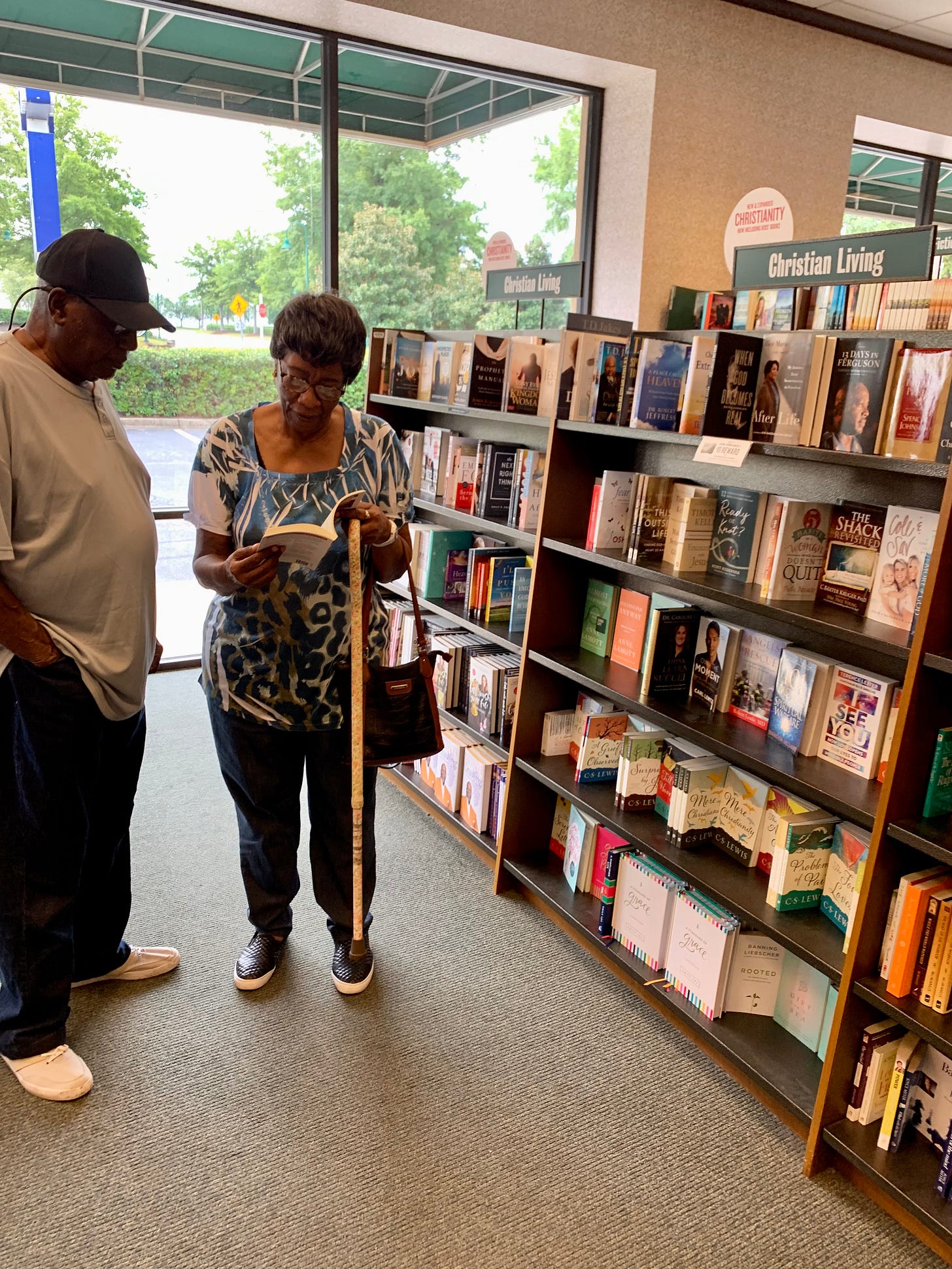Reclaiming Our Narrative
The Importance of Remembering Black History to Build Solidarity
I’ll never forget taking my grandparents to Barnes and Noble to see my book, “I See You,” on the shelf.
It was critical because my grandparents are still alive and very much aware and mobile. They vividly remember growing up during segregation with their parents and grandparents and can recount powerful stories of our family’s struggle. They are living historical epistles.
We stood in Barnes and Noble as they looked at their grandchild having a book in a store. What they shared with me over breakfast made this moment significant after I bought them two copies.
Both of them told me stories of how their grandparents and their grandparents' parents were not allowed to read books or learn. Talk about tears.
Fast forward, we sit across the table reflecting on that pain, struggle, and perseverance; they say my great, great grandparents paved a path for me to read and write.
That moment sits with me daily as I reflect on my K-12 experience as a 40-year-old Black man. I often think back on my K-12 education with a heavy heart.
I am sad it wasn't until my mid-twenties that I became fully aware of my cultural background, history, and heritage in the form of education. Although I am grateful I have gleaned stories from my grandparents lived experiences, still, if I am honest, the topics my grandparents shared with me were never addressed in my school—and scholarship shows that this was all intentional.
I write about this in All God’s Children when I discuss how Dr. LaGarrett King, a distinguished professor, and historian, wrote about this in his scholarly article, “When Lions Write History,” which traces the intentional removal of black history from history books in the K-12 experience.
He examines literature between 1890 and 1940, the long history of how black people were depicted in schoolbooks, and how it was all driven by whiteness and dominated by white males.
He indicated,
“K-12 social studies textbooks [were] written by White historians and educators who used history as a means to explore ideas of U.S. citizenship. It was common in these textbooks to underscore Black persons as inferior and second-class citizens. Early social studies textbooks emphasized that the ‘Black skin was a curse’ through narratives that purported that Black people were naturally ‘barbarians,’ ‘destitute of intelligence,’ or ‘having little humanity’. The racializations of Blackness were used as justifications for the paternalistic attitudes White citizens had towards African Americans.”1
I reflect on Dr. King’s scholarly research and now understand why I was not able to find literature, authors, and resources that reflected my experience in my K-12 experience.
This thought becomes even more worrying as I raise Black children in a world of racial violence and erasure. I feel the need to educate them deliberately about the true history of this country and stories from my grandparents, including more robust lessons from Black History.
Why? Because I do not want my children to have the same experience of being uninformed and unaware about where discrimination comes from and what our ancestors fought through to overcome—like my grandparents.
And if I don’t raise them with this history, shame on me for not making them aware of the long heritage of richness, struggle, and triumph that Black people embody in the face of White Supremacy—especially the stories my grandparents tell me to this day.
If there were a word I would use to describe my early education, it felt one-sided.
I reflect back often and feel robbed of my heritage and history because history has mostly been taught through a white historical lens.
To my dismay, in recent years, particularly with COVID and the awareness of Critical Race Theory, the erasure of Black history from the educational curriculum has become a growing trend in many school districts.2
And this reminds me of personal stories my grandparents tell me to this day about not being able to access adequate books in school, being segregated to parts of town where poverty was concentrated, and how their own parents and grandparents were not able to learn, read, or write because of White supremacy.
So when I reflect on the forthcoming book I have coming out with InterVarsity Press, entitled, All God’s Children: How Confronting Buried History Can Build Racial Solidarity, I am thinking about why confronting history and not burying it is the way forward—especially if we wish to see God’s Shalom, see change, and build solidarity.
For so long, the Black community has fought against the suppression and erasure of our history, and recent actions by Florida and other states have brought this issue back into the spotlight.
When Florida Governor Ron DeSantis signed the “Stop Woke” Act into law, which placed limitations on how race was talked about in classroom settings (which includes a lot of Black history books and African American Studies), I remembered what my grandparents told me when we stood in that bookstore: “they tried to keep our history from us because knowing where we came from made us stronger.”
This law has caused harm to many people who come from a history that has struggle, genocide, abuse, and enslavement in it—like my grandparents.
I can’t help but think about my grandparents and how this is reminiscent of slave codes of the 19th Century that prohibited African Americans from learning and what my grandparents referenced during our time together.
Just consider these words from the Alabama Slavery Code of 1833:
“[S31] Any person who shall attempt to teach any free person of color, or slave, to spell, read or write, shall upon conviction thereof by indictment, be fined in a sum of not less than twohundred fifty dollars, nor more than five hundred dollars.”3
Or the slave code in Florida of the 1800s.
Ironically, even Florida had its Slave Codes, which were part of a broader system of laws enacted in the American South during the antebellum period, aimed to regulate the lives and conditions of enslaved Africans.
One aspect of these laws was the restriction of enslaved Africans' access to education, motivated by the fear that education could lead to a challenge of the system of slavery.
In his scholarly article, Toward a More Humane Oppression: Florida's Slave Codes, 1821-1861, Dr. Joseph Conan Thompson recounts Florida’s history:
For instance, pass laws mandated that slaves receive some form of written permission before venturing off their master’s property. Strict laws against instructing slaves to read, write, set type, or possess any sort of reading material were formidable legal barriers intended to prevent potentially seditious literature from reaching the bondsmen.4
I bring this up because history is essential to understand, so collectively, we know what we shouldn’t repeat as we move forward and how we should show up and act justly in a world where the mind is a battlefield for learning and awareness.
In addition, it is important to explore and examine history so that those who have internalized racially motivated discrimination can understand its roots and reasons and why it is essential to transform this behavior.
Covering up history and removing books and information from classrooms will only result in ignorance, continued injustice, mistreatment, and sharing of a one-sided history.
As I am getting ready to launch my third book, I am taking the time to reflect on why it matters. I plan to take my grandparents to the store again to show them their struggles were not in vain.
I have dedicated this book to my grandparents and all my ancestors who were not given the opportunity to learn, read, and understand themselves in a way that centered our shared history.
I hope you will join me in committing to learning the entirety of our shared history as well.
LaGarrett J. King, “When Lions Write History: Black History Textbooks, African-American Educators, & the Alternative Black Curriculum in Social Studies Education, 1890-1940.” Multicultural Education 22, no. 1 (2014): 2-11.
“SPLC Files Amicus Brief in Suit against Florida's Stop Woke Act.” Southern Poverty Law Center, May 26, 2022. https://www.splcenter.org/news/2022/05/26/splc-files-amicus-brief-suit-against-floridas-stop-woke-act.
“Literacy as Freedom - American Experience.” Accessed April 21, 2023. https://americanexperience.si.edu/wp-content/uploads/2014/09/Literacy-as-Freedom.pdf.
Thompson, Joseph Conan. "Toward a more humane oppression: Florida's slave codes, 1821-1861." The Florida Historical Quarterly 71, no. 3 (1993): 324-338.





I totally agree and believe this holds true for all people of color. History has definitely been constructed through a white narrative. Love the courage & incentive you live out as an example to us. Shame on us if we don’t dive in, ask questions, study, learn and pass down our history, stories and truth.
Thank you for the example you set and the legacy you’re building upon.
Yes, the history that I was taught in school was one-sided as well. I thought black history started from when we were slaves. It wasn’t until I was in my 20s that I learned our rich history goes waaay back to biblical times, and we were kings and queens with power, wealth, and intellect beyond imagination.